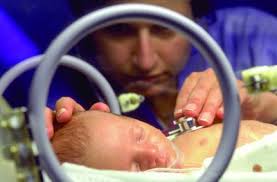 Shoulder Dystocia is a form of obstructed labor and is considered an obstetric emergency. It is diagnosed when the fetal shoulders fail to deliver shortly after the fetal head. This happens when after the delivery of the infant head, the anterior shoulder of the infant cannot pass below, or requires significant manipulation to pass below, the pubic symphysis (cartilage connecting the pubic bones).
Shoulder Dystocia is a form of obstructed labor and is considered an obstetric emergency. It is diagnosed when the fetal shoulders fail to deliver shortly after the fetal head. This happens when after the delivery of the infant head, the anterior shoulder of the infant cannot pass below, or requires significant manipulation to pass below, the pubic symphysis (cartilage connecting the pubic bones).
Many instances of shoulder dystocia can be anticipated and prevented if the warnings signs are heeded by medical professionals. There are some instances of shoulder dystocia that cannot be anticipated. However, injury to the infant can still be prevented if the appropriate steps are taken once the shoulder dystocia occurs.
Recognized risk factors
- Advanced maternal age, > 35
- Short in stature
- Small or abnormal pelvis
- More than 42 weeks gestation
- Infant large for gestational age, > 9 lb 9 oz
- Maternal obesity
- Maternal diabetes (2-4 fold increase in risk)
Despite these recognized risk factors, shoulder dystocia is often difficult to predict. There are other signs that may point to the condition:
- Need for oxytocics
- Prolonged first or second stage of labor
- Head bobbing in the second stage
- Instrumental delivery – use of forceps or vacuum
Complications
The major concern of shoulder dystocia is damage to the upper brachial plexus nerves. These supply the sensory and motor components of the shoulder, arm and hands. The ventral roots (the motor pathway) are most prone to injury. The most probable cause of the injury is manual stretching of the nerves. Excess tension can also physically tear the nerve roots out from the neonatal spinal column, resulting in total dysfunction. Here is a list of possible complications from shoulder dystocia:
- Klumpke paralysis – a variety of partial palsy of the lower roots of the brachial plexus
- Erb’s palsy – paralysis of the arm caused by injury to the upper group of the arm’s main nerves
- Fetal hypoxia – fetus is deprived of an adequate supply of oxygen
- Fetal death
- Cerebral palsy – damage to the parts of the brain that control movement, balance and posture
- Maternal post-partum hemorrhage – loss of more than 500-1000 ml of blood within the first 24 hours following childbirth
- Vaginal lacerations and 3rd/4th degree tears, extended episiotomies
- Uterine Rupture
What to do if you suspect a birth injury was caused by should dystocia
A birth injury is any injury to an infant that occurs during delivery or immediately after delivery. There are many different types of birth injury – some have temporary symptoms and others have permanent effects that last a life-time.
There is no way to know how a specific birth injury will affect an infant immediately or over time. Just as each infant is unique, so too are the circumstances surrounding the labor and delivery, as well as the birth injury itself.
Since no two infants are alike – the severity of a birth injury varies greatly between infants. The same injury may cause mild symptoms in one infant and severe symptoms in another. Lastly, some birth injuries – such as developmental delays or cognitive impairment – may not be detected until the baby is older.
If a child is diagnosed with any of the conditions listed above, it merits further investigation to be sure Standards of Medical Practice were followed to ensure patient safety. A personal injury attorney well-versed in medical malpractice, and specifically birth injuries, should review the circumstances of the labor and delivery to determine if there was negligence.
Casey Devoti & Brockland is a St. Louis-based personal injury law firm. Together Matt Casey , Matt Devoti, and Anne Brockland have nearly 40 years of trial experience. They handle a variety of personal injury matters, including: car, truck and train accidents, victims of impaired and distracted driving, medical malpractice and birth injuries, product liability, slips/trips/falls, elder care and sexual abuse, Workers’ Compensation, and wrongful death. Matt, Matt and Anne proudly serve clients throughout metropolitan St. Louis, southeastern Missouri and southern Illinois. If you or a loved one have been injured by the negligence of another, call the office today for a free, no-obligation consultation: (314) 421-0763.








